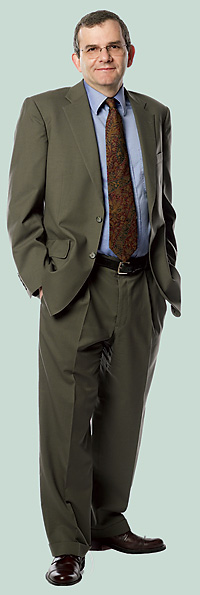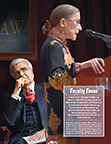Introducing Samuel Scheffler
Affiliated Professor of Law Professor of Philosophy and Law, Faculty of Arts & Science
Printer Friendly Version
The academic grilling—skewering,some might say—that marks the Law School’s Colloquium in Legal, Political and Social Philosophy has unnerved many an accomplished scholar. Yet when Samuel Scheffler opened his presentation last fall, he took the opportunity to take a playful jab at his colleagues instead.
Scheffler told the gathering he was glad Jeremy Waldron had joined professors Ronald Dworkin and Thomas Nagel in running the colloquium “because,” he said in his trademark deadpan style, “it wasn’t much of a challenge with just the two of them.”
Although Scheffler does not hold a law degree, his area of expertise—moral and political philosophy—overlaps with studies in jurisprudence, the theory and philosophy of law. When he arrives at NYU in 2008-09, he will divide his time between the philosophy department and the Law School, as he’s done at Berkeley since 1997. (He taught exclusively in Berkeley’s philosophy department from 1977 to 1997). There, he teaches the Workshop in Law, Philosophy and Political Theory, which he freely acknowledges as “a shameless ripoff of the colloquium.”
Reserved and unassuming, Scheffler, 55, is known not only for his wry wit—making him Berkeley’s most sought-after roast master—but for his lucid mind and relevant work. “He contributes to any discussion with a very pure and targeted statement,” says Nagel, who was Scheffler’s Ph.D. adviser at Princeton University 30 years ago.
Eric Rakowski, who coteaches the Berkeley workshop, adds that when Scheffler presents a summary of the presenter’s work, the visiting professors routinely ask him for a copy, noting, “It’s so beautiful, and it typically improves on the argument of the paper itself.”
Nagel calls Scheffler “one of the leading moral philosophers now writing. His work is about real, moral problems, not just abstract questions.” Adds onetime Berkeley professor Robert Post, now at Yale Law School, “Many philosophers write what they can get right. Sam writes about what matters.”
An ongoing theme of Scheffler’s current papers and his three books, The Rejection of Consequentialism (1982), Human Morality (1992) and Boundaries and Allegiances (2001), is the tension between ideas of universal justice and cosmopolitanism—the idea that all of humanity belongs to a single moral community—on the one hand, and a person’s particular loyalties and affiliations, such as family, nation and religion, on the other.
“I’ve spent a good deal of time investigating the reasons and responsibilities that arise from our development of personal projects and our participation in interpersonal relationships,” he says. “I have tried to explain the sources of these reasons and responsibilities, and to consider the extent to which they take priority over other proposed duties, such as the duty to promote the general welfare or to maximize the overall good.” In “Morality and Reasonable Partiality,” a paper he delivered at NYU in March, Scheffler argues that “up to a point, but only up to a point, we are not merely permitted but obligated to give the needs and interests of our intimates and associates priority over the needs and interests of others.”
Scheffler practices what he preaches. Berkeley colleague Sandy Kadish, a founder of that law school’s Jurisprudence and Social Policy Program (JSP), where Scheffler teaches his workshop, says he’s “a devoted citizen of the university community. He’s not the kind of fellow who says, ‘No, I’m too busy.’” Plus, “He doesn’t speak a lot at meetings, but when he does, people listen carefully.”
Scheffler has served as chair of Berkeley’s Department of Philosophy; has headed up the department’s personnel, admissions and placement committees; was active in the Law School Dean Search Committee; and served as an acting vice provost. While a faculty in residence at NYU last spring, Scheffler organized both the law and philosophy faculties to raise the profile of their course offerings and research opportunities.
He was brought up in the Boston area by his mother, Rosalind, a clinical psychologist, and father, Israel, a philosophy professor at Harvard University. A rebellious product of the 1960s, he received his first philosophical education as a teen arguing with his father. “My basic view was that whatever he said must be wrong,” Scheffler recalls. When Israel opposed the Vietnam War, Samuel took the opposite position—at least until the antiwar fervor swept him up. “Then I argued that my dad wasn’t far enough left,” he says. Through such father-son volleys, Scheffler says, “I was getting some sense of how you construct an argument and what resources there are for developing a position.”
Scheffler, who first got interested in politics and journalism in high school, entered Harvard to study political science. Much to his surprise, he found himself drifting toward philosophy, “where people were grappling with the most fundamental questions.” Upon completing his doctorate in philosophy, Scheffler landed a teaching job in Berkeley’s philosophy department, then joined the JSP program as well. He met his wife, Kathryn, when she worked at the university, and the two wed in 1983. They have two grown sons, Adam and Gabriel.
As for his move East, he says, “Berkeley is a wonderful place. I’ve loved being there.” But, he continues, “the central figures [in law and philosophy] are at NYU,” singling out professors Dworkin, Nagel, Waldron and Liam Murphy. “It’s a really extraordinary collection of people. Given the opportunity to join this group of people, anybody with my interests would have to have a very good reason not to do it.”
—
